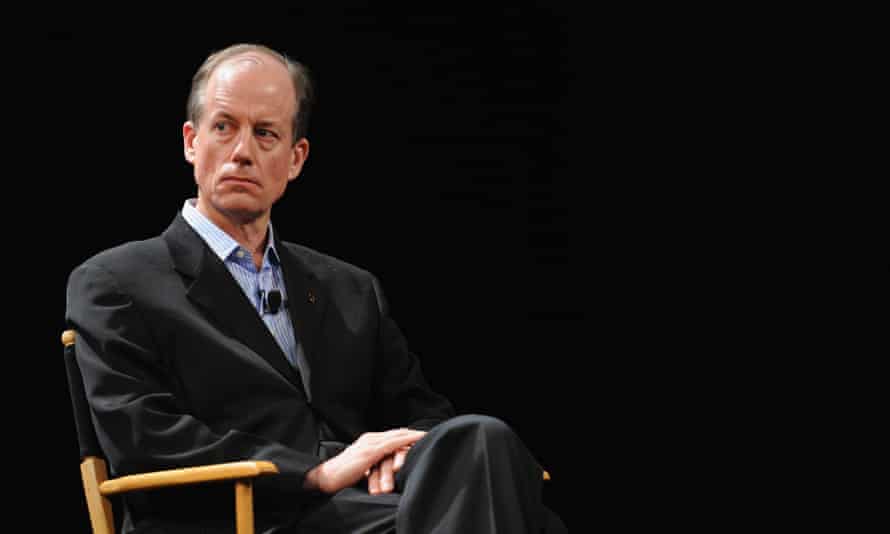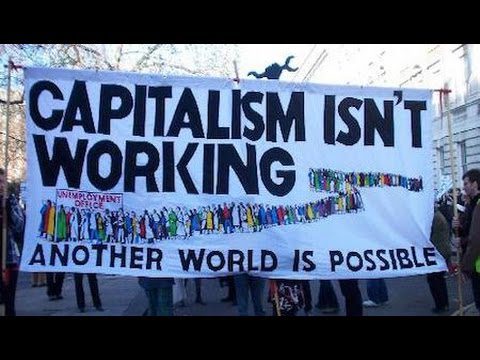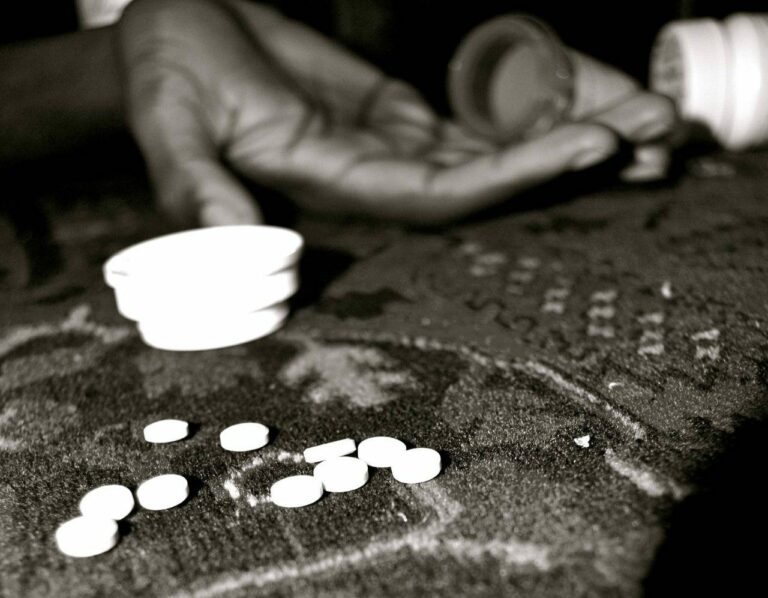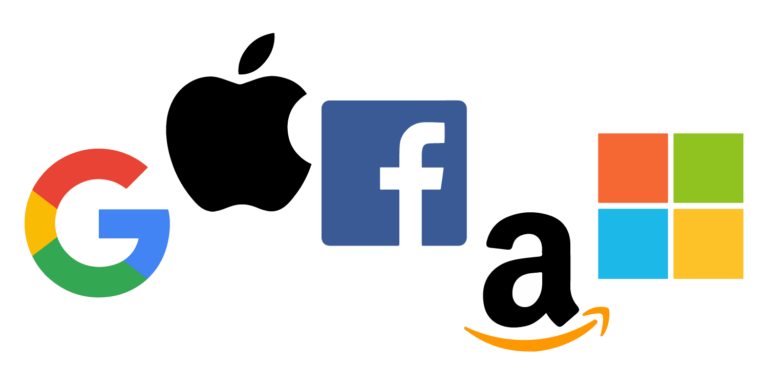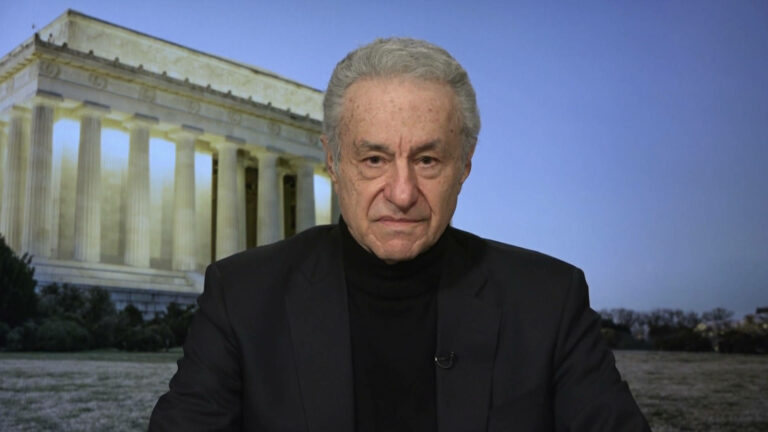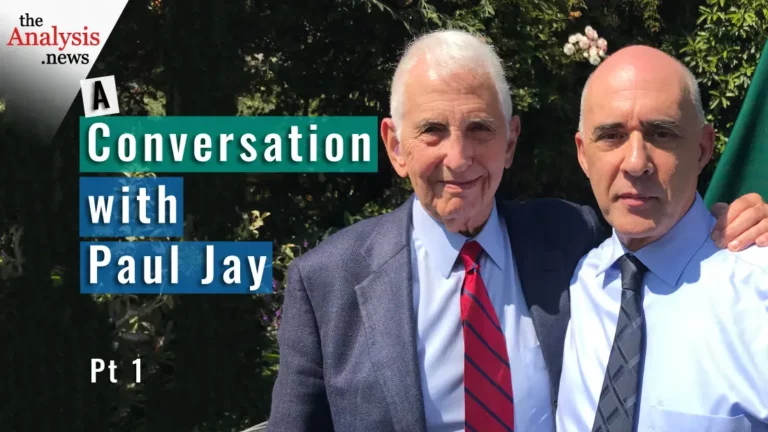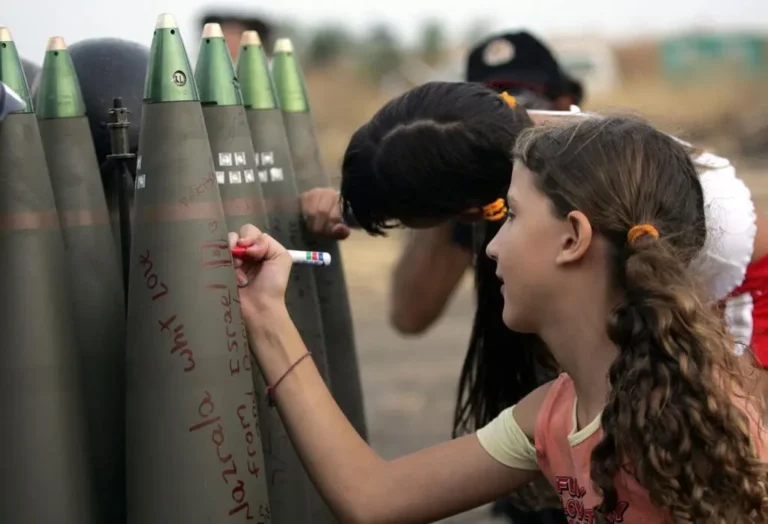From 9/11 to Mass Surveillance, The Man Who Knew Too Much – Thomas Drake on RAI Pt 2/6
On Reality Asserts Itself, Mr. Drake, a former Senior Executive at the National Security Agency, says he was targeted by the NSA because he exposed that the agency had intel that could have prevented the 9/11 attacks and because he blew the whistle on a massive secret surveillance program aimed at Americans. This is an episode of Reality Asserts Itself, produced August 2, 2015, with Paul Jay.
STORY TRANSCRIPT
PAUL JAY, SENIOR EDITOR, TRNN: Welcome to Reality Asserts Itself on The Real News Network. I’m Paul Jay. The man who knew too much–that’s Thomas Drake. Thomas Drake was in the Air Force, he was in the NSA, and, for many years, in and out of various parts of the American national security state, both in public service and in the private sector. I say the man who knew too much, but he’s also the man who saw and spoke. Internally to begin with, he raised objections to the NSA having knowledge about 9/11 and not making use of that knowledge to prevent 9/11. He went public eventually, but first anonymously, on a mass surveillance program that he thought violated the Fourth Amendment. He went public eventually, but first within all due internal process, on what he thought was a waste of multibillion-dollar program that had been created for mass surveillance. So not only did it violate the Fourth Amendment; it also was a big boondoggle. The man who knew too much now joins us in this studio. Thanks for joining us, Thomas.
THOMAS DRAKE, WHISTLEBLOWER AND FMR. NSA SENIOR EXEC.: Thanks for having me.
JAY: So, just quickly, Thomas is a former senior executive at the U.S. National Security Agency. He’s a decorated United States Air Force and United States Navy veteran. And as I said, he’s a whistleblower. He’s a whistleblower who was indicted–didn’t go to jail, but you came pretty close. First of all, in Reality Asserts Itself, as most of our viewers know, I usually start with a personal back story. We’re going to get there, but we’re not going to quite start there. For people who don’t know your case, kind of just quickly, why did they go after you?
DRAKE: They went after me because I knew too much about several things, and I shared it within channels, and ultimately went to the press anonymously, and over the course of a number of years. But I was confronted by the dark side shortly after 9/11. So the first thing was the secret surveillance programs that were put into place as a result of 9/11 and unleashed on the Petri dish called the United States of America, turning the United States of America into the equivalent of a foreign nation for dragnet electronic surveillance. To this day, we still don’t know the full extent of that.
JAY: And we’re going to dig into all this.
DRAKE: Yeah. And then there was also the 9/11 knowledge, what NSA actually knew, what they should have known, what they didn’t share, what they kept hidden, and information that they never even discovered until later.
JAY: But you have said that if it had been acted on, it might have been able–that information might have led to preventing the 9/11 events.
DRAKE: Well, I consider NSA quite culpable. In fact–well, we’ll get into the detail as to why, but extraordinarily culpable. And they’ve been covering up their culpability ever since. What happened is I ended up speaking truth to power, starting with NSA, and they didn’t like that. And I ultimately became a material witness in several government investigations, including two 9/11 congressional investigations, a Department of Defense Office of the Inspector General audit and investigation. And the long story short, after significant reprisal and retaliation, the New York Times article comes out in December 2005 revealing for the first time publicly the existence of the so-called terrorist surveillance program–it was not known as that. It was a convenient cover. That caused a huge stir at NSA and within the Department of Justice. They referred it to the Department of Justice for criminal investigation, and I was put on a target list shortly thereafter.
JAY: And you’re eventually–.
DRAKE: And I ended up being summarily visited by the FBI in November 2007 when they raided me, raided my house, and raided my office down at the National Defense University. And then, long story short, in April 2010 I was very publicly indicted on a ten felony count indictment, five under the Espionage Act, facing 35 years in prison. Fortunately, I’m sitting in front of you as a free human being. I never did it end up in prison, never did end up paying a fine.
JAY: Okay. And we’re going to get to that story. We were chatting quite a bit off-camera before we started the interview, and you repeated several times the phrase that you feel burdened by history. What do you mean?
DRAKE: I’m extraordinarily burdened by history. It’s the what ifs, it’s the dirty knowledge I had about secret surveillance, it’s the dirty knowledge about critical intelligence that NSA actually had prior to 9/11 that was not shared properly with national command authorities, as we call them. They could have stopped 9/11 all by itself, just from the NSA intelligence, never mind CIA or FBI. It was a systemic failure. I’m burdened by the massive multibillion-dollar fraud on an extraordinary scale, that the response to the failure of the government to provide for the common defense was let’s just spend a lot more money ’cause we’re too big to fail. I’m burdened by the mass surveillance regime that was put into place in the deepest of secrecy. All of this I’m burdened by. And it’s going on 14 years now. I looked into the Pandora’s box, and it was very, very dark. And the abyss looked back at me.
JAY: And burdened because of what you had believed before you had looked into the box and what this did to your vision of what America was?
DRAKE: Well, no. My eyes were wide open coming into NSA. Some people have this idea that somehow I was naive coming into NSA. In fact, I was actually–my sanity was questioned as to whether or not I really wanted to join NSA.
JAY: And your first day of the NSA is actually 9/11.
DRAKE: First day I reported. I actually took the oath prior. It was all in processing. But the first day that I reported to my new job was the morning of 9/11.
JAY: So if you weren’t naive, why’d you join?
DRAKE: It was an opportunity to serve my country again at a very senior-level. And I’d answered an ad in the paper in February 2001. They were looking for outsiders. NSA had been placed under lots of attention, and they were clearly having difficulty keeping up with the digital age, and they were severely challenged in a post-Cold War environment. And here they were, almost ten years on, and they hired in about a dozen people. Their key stakeholder, Congress, particularly the intelligence committees, had been taking NSA to task for some years. And so they very reluctantly–it was general Michael B. Hayden–brought in about a dozen of us.
JAY: So, again, why the word burden? I mean, if you say your eyes were wide open when you join–.
DRAKE: It’s burdened by what happened after I joined. I mean, I never quite imagined that the period in which I grew up as a very young teenager in the 1970s, that I would end up not only revisiting, but I would be reliving it on a far vaster scale in terms of government criminal wrongdoing, crimes, you know, high crimes and misdemeanors as defined by the Constitution.
JAY: Reliving it meaning Nixon.
DRAKE: Reliving the Nixon era, reliving the Watergate and then some. It makes the Nixon era look like pikers, what happened in 9/11, in terms of the government simply unchaining itself from the rule of law and operating under extraordinary emergency conditions, the equivalent of martial law in the country, but in secret. Virtual martial law is actually what was instituted in the United States of America, truth be told.
JAY: Again, why do you feel personally burdened by that? ‘Cause you were a part of it?
DRAKE: Because I would not remain silent. And I spent many, many years defending the Constitution against my own government. And I came up short. I was unable–and with others. It wasn’t just me; it was many others as well who raised serious questions about what we were doing. But I’ve confronted all this early, early on; within days and weeks of 9/11, I was confronted by the specter of Pandora’s box opened up.
JAY: For example?
DRAKE: Well, I found out within days that an oral decision, I mean, oral authority had been given by–verbal authority, verbal authority from the White House, authorizing NSA to start spying on the U.S. on an extraordinary scale, starting with phone numbers and special arrangements of certain telephone companies, starting with AT&T. And I remember–I mean, we may get into more details on this, but I confronted the lead attorney.
JAY: Within days of 9/11.
DRAKE: Within days, a verbal authorization was granted NSA.
JAY: Is that possible that that decision can be made so quickly and not had been thought about before 9/11?
DRAKE: Yes. As one of the attorneys that I confronted told me, you don’t understand, Mr. Drake. We live in exigent conditions. All means necessary apply. And I said, including breaking the law and the–. You don’t understand.
JAY: Do you think there was some kind of plan in place prior to 9/11 for such a thing?
DRAKE: I wouldn’t say a plan. I think Cheney was looking for an excuse to reestablish, reassert the imperial presidency. He always thought that Nixon had gotten a raw deal in terms of history, and here was his moment. He was ascendant. You know, he was a shadow president. He was–been handed the national security portfolio by Bush. Nine/eleven was a convenient crisis in which to implement unitary executive authority. I’ll just say it that way.
JAY: And we’re going to get into a whole segment about 9/11 and how this crisis comes to be.
DRAKE: So you’re staring into the Pandora’s box. What do you do? I mean, I’m not the one who made the decisions, but I now have the dirty knowledge. So I decided that I could not remain silent. If I remained silent, I’d be an accessory to a crime. I was eyewitness to the subversion of the Constitution. I took an oath to that Constitution, and I was going to hold true faith and allegiance to the same. I didn’t take an oath to the president. I didn’t take an oath to secrecy. I didn’t take an oath to anything else other than defending and supporting the Constitution against all enemies, foreign and domestic.
JAY: Well, why didn’t you buy the narrative that this was an extraordinary moment, America was under attack?
DRAKE: ‘Cause we had failed the nation, under the preamble of the Constitution: we had not provided for the common defense. But instead of actually acknowledging that failure, NSA and others took it as a huge opportunity. And as Rahm Emanuel so famously said, never let a good crisis go to waste. And clearly they were not going to let this crisis go to waste. But there’s dark history here. None of this should have happened. And I’m eyewitness to a number of events that took place prior to 9/11 in which the alarm bells had been going off for many, many years.
JAY: For example?
DRAKE: Including my own experience as a reserve intel officer in the Navy down at the Pentagon.
JAY: Start there.
DRAKE: Well, I was on the terrorism desk for 18 months. I was there when they tried to drop the–.
JAY: What year are we in?
DRAKE: Hm?
JAY: What year?
DRAKE: That was the ’93-94 timeframe. I was there when they tried to drop the World Trade Center towers the first time, with truck bombs. And I was–we were sending out reports. And I remember the senior intelligence officer, right, the J2, who reports to the Joint Chiefs of Staff, coming down to the alert center, the National Military Joint Intelligence Center, saying, yeah, I’m seeing all the reports, but who cares, right, about some, you know, raghead in the desert? Literally said that. Who cares? Not understanding in ’93 how serious they were about sending a message. We knew then that they wanted to demonstrate their–let’s just say their beef with the West by attacking Western landmarks. We sent out reports then that they’re going to come back. And they came back. Okay? This is part of the burden, this burden that we just failed the nation, we–not only were 3,000 people murdered; hundreds of foreigners were murdered that day as well on 9/11. That all burdens me. Okay? ‘Cause it’s the what if for me. What if the critical intelligence had been shared? What if? I realize 9/11 happened, but for me it’s life before 9/11, and there’s life after 9/11. And what I saw happen after 9/11 in the deepest of–the bowels of NSA, right, I shudder when I even go back and replay all that. You don’t witness your own government subverting the Constitution right out from under you–no consent of the governed, no conversation, no discussion, no debate–without knowing that it’s fraught with enormous strategic peril, that it would have enormous consequences downstream. I knew all that then. I just couldn’t turn aside. I had to speak up and I had to defend the Constitution, this piece of paper that if it doesn’t mean something, then what matters in terms of our form of governance, realizing it’s rather imperfect.
JAY: Prior to 9/11 you said there were several moments like that.
DRAKE: Oh, there’s other moments. Remember, I was at NSA as well as a contractor, but it was also in the Navy for a number of years during this whole period. Yeah.
JAY: What’s another example?
DRAKE: Well, another example is Tenet. He sent out memos to the entire intelligence community that “the system was blinking red,” 1998, “blinking red”. And we had all the incidents leading up to 2001. All the evidence was there. All of it. And that doesn’t even begin to address the reality of what NSA already knew prior to 9/11. They had what they call cast-iron coverage on the Yemeni switchboard, the safe house. They’d been monitoring that safe house since at least 1996. It’s an absolute lie of the U.S. government to say that we didn’t know about the two hijackers in San Diego, for example. Absolute lie.
JAY: Well, let’s focus on that, because I think that’s one of the most revealing stories of the whole pre-9/11 intelligence gathering, because it involves all the agencies. So, quickly, we have–I’m not very good at remembering the names, but we have two of the guys that end up on the American Airlines plane are in San Diego. We have a guy who works as some kind of consultant with the Saudi government, and later, if I understand correctly, there’s suggestion he’s an FBI informant or asset in some way as well.
DRAKE: That’s another dark thread that has not been fully unraveled, that they were trying to flip people, or at least turn them into informants, some of them.
JAY: But there’s three agencies, at least, that know that these two guys are in San Diego, and they’re working with a guy who’s connected with the Saudis. The FBI knows they’re there, the CIA knows they’re there, and the NSA knows they’re there. And we are supposed to believe that none of them ever passed on this information, and never talked to each other about it. It seems a little bit bizarre.
DRAKE: Bizarre. But you have to understand the culture of the intelligence agencies. They have their own egos, and information is power: I know something that you don’t; if I share it, I give away my power. So you’re very careful about who you give your information to.
JAY: Well, let’s break down the story a little bit and let’s get clear on what each agency knew.
DRAKE: I can only speak to what I know about NSA. I’m most certainly aware of others, but just so you’re aware in terms of your interviewing me, I will only speak directly to what I’m aware of or what I discovered or what I gave to investigators and what I’ve written about. I’m well aware of speculation, some of it quite informed, some of it probably true in terms of CIA and FBI.
JAY: Well, let me read something you’re quoted in and you signed. It’s called the “NSA Insiders Reveal What Went Wrong”. And this is kind of a memorandum that was written by you and some of your other intelligence colleagues that have also–some of them whistleblowers, some who have become critics, people like Binney and Ray McGovern. And in this, you’re quoted as saying:
“NSA had the content of telephone calls between AA-77 [American Airlines 77] hijacker Khalid al-Mihdhar in San Diego, CA, and the known al-Qaeda safe house switchboard in Yemen [which you had just mentioned] well before 9/11, and had not disseminated that information beyond NSA.
“In short, when confronted with the prospect of fessing up, NSA chose instead to obstruct the 9/11 congressional investigation, play dumb, and keep the truth buried, including the fact that it knew about all inbound and outbound calls to the safe house switchboard in Yemen. NSA’s senior leaders took me off the task because they realized–belatedly, for some reason–that I would not take part in covering up the truth about how much NSA knew but did not share.
DRAKE: That’s actually–just for clarification, that’s in–so the context is critical here, not just the content. But what’s critical is that I was actually selected as a senior executive to provide the draft statement for the record, in which General Hayden would actually go down to–this was the Saxby Chambliss subcommittee. He had a subcommittee on homeland security, had been recently formed. He began the first 9/11 congressional investigation. It led to the much, much larger joint inquiry, which was the basis for the 9/11 Commission. I was tasked with putting together that statement for the record. And there’s a whole story behind this. But ultimately I was taken off. Why? Because I found out the truth, the critical intelligence that NSA actually had and did not share, reports they had, all the information regarding the switchboards. So I was taken off the task. As I was told by the number-three person at NSA, who I reported to, it was a data integrity problem–a euphemism for you know too much.
JAY: Now, just to be–for everyone to understand, when you join–your first day actually showing up for work is 9/11–you’re at a very senior level. What is it you’ve been asked–what have you been hired to do?
DRAKE: I was actually hired–my literal title was senior change leader, and I reported to the signals intelligence director. That was Maureen Baginski.
JAY: In your job description, what was your [crosstalk]
DRAKE: I was brought in to help because this was part of the stakeholders, and particularly Congress, was that NSA was having great difficulty meeting the demands of the 21st century. And that was both in technology, that was in terms of management and leadership practices, as well as process. So I was brought in to advise them and to help put in those practices, information sharing within, critical enabling technologies.
JAY: And how senior are you? In the hierarchy, where are you at?
DRAKE: I was at the second-tier level. I’m reporting to the number three, and only above that’s deputy director and director.
JAY: Hayden.
DRAKE: That’s right. And Bill Black was the then deputy director.
JAY: So when you say there was evidence about San Diego, NSA had these phone calls back to the al-Qaeda, what was known to be an al-Qaeda switchboard in Yemen, NSA had, were listening to these calls and don’t share it, how do you know they don’t share it?
DRAKE: ‘Cause I know that from what I found out during the course of my time there in the months after 9/11. There’s no evidence at all that it was shared with any of the normal authorities. There was a back channel, there was a back channel that was created with Cheney after 9/11.
JAY: That’s my question.
DRAKE: But we’re talking about the intelligence prior to 9/11. And NSA had what they call cast-iron coverage on the Yemeni safe house, which means essentially it’s 24-7, 365. No matter what call is made into that switchboard, not only is it recorded; the content is also kept as well. And any number coming in, even if it’s from the United States, you’re going to know about it. And under the Foreign Intelligence Surveillance Act, if you believe that it rises to the level of somebody in the United States, even if they’re a resident alien, legal or not, but resident alien, defined as U.S. [incompr.] U.S. person, you then can get the warrant from the secret court and listen in.
JAY: So if you’re saying it wasn’t shared, Richard Clarke, who was the chief terrorism czar, who under Clinton had cabinet level–and I always have said this many times in interviews on The Real News–it’s rather interesting that one of the first early things that happens is after George Tenet, head of CIA, tells George Bush in the first security briefing the number-one threat to the United States is al-Qaeda and bin Laden, you then demote your national security guy, Clarke.
DRAKE: It wasn’t a priority. I have to say that. It was not considered a strategic priority, the fact that NSA itself didn’t consider counterterrorism a strategic priority. It wasn’t a focus of their attention. It really wasn’t. That’s part of the bubble I keep trying to pop, this idea that somehow the United States, in spite of the Tenet memos, the system as a whole simply was not paying much attention to it.
JAY: Well, let me tell you what Richard Clarke says. Richard Clarke in a documentary was asked specifically about why he didn’t know about the intelligence about San Diego, and here’s what he said.
~~~
RICHARD CLARKE, FMR. NATIONAL COORDINATOR FOR SECURITY, INFRASTRUCTURE PROTECTION, AND COUNTER-TERRORISM: You have to intentionally stop it. You have to intervene and say, no, I don’t want that report to go. And I never got a report to that effect. If there was a decision made to stop normal distribution with regard to this case, then people like Tom Wilshire would have known that.
~~~
JAY: Richard Clarke is saying it’s not just a question of prioritization. He’s saying a deliberate decision had to be made in the normal flow of information. Now, let’s remember, this is during a time when he’s already saying our hair’s on fire. He testifies that–talk about blinking red. It was passed blinking red. The NSA has to be aware that Clarke and others think something’s coming. We know from the interview we did with John Kiriakou that the CIA tells–he couldn’t name the country; he says an Arab country’s ambassador. But a senior CIA official tells a senior Arab ambassador that we know something’s coming, it’s going to be horrific, and if you have any information on it, you have to tell us, ’cause we know something terrible’s coming. So how in a context of that do you not pass on that information and not prioritize unless there’s–and as I say, we’ve talked to Bob Graham, who was the head of the Senate Intelligence Committee, about all–there are so many examples of pieces of intelligence.
DRAKE: Yeah, but they’re all buried. The critical pieces didn’t rise to a level sufficient to actually reveal the plot in a way that you could take direct action, although the intelligence was there. It just wasn’t being analyzed properly. That’s a fact.
JAY: Well, the intelligence was there was a fact.
DRAKE: It was there. It wasn’t being analyzed in a way that would reveal the fuller plot, let alone actually take out the perpetrators.
JAY: Well, we know that the FBI knows about these guys in San Diego.
DRAKE: They were trying to flip them.
JAY: Well, ’cause I also heard the CIA knows about them and they were trying to flip them.
DRAKE: That too. That’s true too.
JAY: The CIA’s trying to–and the CIA apparently doesn’t want to tell the FBI and the FBI doesn’t want to tell the CIA.
DRAKE: That’s all the institutional prerogatives.
JAY: Okay. But they all have a burden to report to Clarke. And Clarke says–.
DRAKE: Clarke’s an outsider.
JAY: Well, Clarke says they deliberately don’t tell me. So if they’re not telling Clarke, how can they–.
DRAKE: They don’t trust Clarke.
JAY: Well, how can they not be telling Cheney?
DRAKE: I don’t have evidence that they told Cheney. It’s very possible, because Cheney had quickly created his own intelligence network from those he trusted. Clarke was not part of that network. Fact. So he was cut out.
JAY: So the back channel to Cheney is created pre-9/11, then.
DRAKE: There is a back channel to Cheney.
JAY: Pre-9/11.
DRAKE: Pre-9/11.
JAY: So if Clarke said–.
DRAKE: And remember, even as late as August, it is true that the PDB, of which I used to be a part when I was down at the Pentagon doing imagery analysis, the PDB actually did in fact–there was the president’s daily brief that first week in August, talking about they’re going to use–.
JAY: Yeah, how do not prioritize what you know about these guys, the Yemen connections, and there’s a presidential–a memo, briefing from the CIA, saying bin Laden plans to attack America?
DRAKE: That’s correct.
JAY: And you know two guys are in Seattle.
DRAKE: Yup. They let it happen.
JAY: That isn’t–yeah, this isn’t just about prioritization.
DRAKE: Yeah, it is.
JAY: But let me–I asked the question–
DRAKE: It was convenient. It was–.
JAY: –I asked to Bob Graham.
DRAKE: Okay.
JAY: Here’s what I asked to Bob Graham. We’ll play a clip. I interviewed Bob Graham and asked him exactly this question.
~~~
JAY: So I’m going to say something which I think all you can do is say, I can’t comment on, but I’m going to say it. If you’re right–and I’m going to take what you said even a little further, which–if you are right that Bandar knew this was going on, then he’s sitting meeting with his friend President Bush regularly in the days leading up to 9/11 and either not saying anything or somehow does. I mean, I know you know there’s a lot of theory–and, I think, a lot of evidence that would at least require an inquiry–that there’s a deliberate attempt not to know. It’s not just lack of–just incompetency and–. I mean, to believe that it’s just incompetency, then you have to think it’s like the Keystone Cops of intelligence agencies: they’re just tripping all over each other. But that seems hard to believe.
GRAHAM: Well, and also the fact that it was so pervasive that virtually all of the agencies of the federal government were moving in the same direction, from a customs agent at an airport in Orlando who was chastised when he denied entry into the United States to a Saudi, to the president of the United States authorizing large numbers of Saudis to leave the country, possibly denying us forever important insights and information on what happened. You don’t have everybody moving in the same direction without there being a head coach somewhere who was giving them instructions as to where he wants them to move.
JAY: So that includes before and after the events.
GRAHAM: Primarily before the event. After the event, it shifts from being an action that supports the activities of the Saudis to actions that cover up the results of that permission given to the Saudis to act.
JAY: So I’ll put you a little bit on the spot here. Would it be–in this new commission that we hope comes, would it be a legitimate line of inquiry into whether President Bush and/or Vice President Cheney knew something might be coming and didn’t do anything about it, in fact may have actually taken action in the sense of creating a culture of not wanting to know?
GRAHAM: Well, without by giving this answer inferring that I believe that they did in fact have reason to believe that this attack was about to occur and made a conscious decision to suppress that information, if there were any evidence–and to my knowledge there is none–of course that would be a line of inquiry that would be central to answering the question of what was the Saudis’ role and why did the United States cover it up.
~~~
DRAKE: Look, we had known since 1998, with all the intervening terrorist incidents–you had the Khobar Towers, you had the embassy, you had the Cole, you had a number of other incidents as well, clearly all part of the pattern. And it was clear even in the intelligence that there was something else that was even bigger. So it’s not like this was not known. It was even known that it could be something in terms of a significant landmark or landmarks.
JAY: Well, based on some reporting by Jason Leopold and others, it could have–there’s actually–thought it might be the Twin Towers.
DRAKE: Yeah. But remember, this part of the burden. I was there literally when they had tried to drop the World Trade Center towers the first time. So part of the fear was that they would come back using something different. We also knew about the Bojinka. This was that plot during the mid ’90s about blowing up airliners over the Pacific. This idea that Condi Rice postulates that no one could have imagined, it was well imagined that you could use airplanes as missiles. All known. And I’m not even addressing what–you already touched on some of it, my fellow whistleblower, FBI, Coleen Rowley, right, what became the infamous letter that she sent to the director of the FBI and testified before the Judiciary Committee. Yeah, it was known that–.
JAY: That there were guys in Minneapolis learning how to stay take off, and they don’t want to learn how to land.
DRAKE: That’s correct.
JAY: And they can’t get a warrant to get to the guy’s computer.
DRAKE: Yes.
JAY: Now, all of a sudden, the FBI’s so worried about getting constitutional rights to get to somebody’s computer.
DRAKE: Yeah.
JAY: There are so many examples like this.
DRAKE: There’s a number of examples, I agree.
JAY: Okay. Well, we’re going to continue this, where I’m going to ask–you join the NSA, you said, to defend your country. And then off-camera you told me, but this–.
DRAKE: Well, I joined–I say defend my country. See, I had served in the Air Force during the Cold War. Okay? I flew in RC-135s, listening in on the Warsaw Pact. I became–the target country in which I became an expert as a crypto linguist was East Germany. Okay? So I was certainly well aware of what a surveillance police state looks like and sounds like. Okay? You don’t listen in on those type of communications year after year without it affecting you in terms of what does that mean, right, and why it’s important not to go in that direction. So I had served in the Air Force, I actually had a short stint at the CIA, and then I had been at the Navy for a number of years.
JAY: Alright. I’m going to stop you, ’cause this is where we’re going to pick up in the next segment, ’cause we’re going to get to how you go from there, from the Navy and from fighting for your country, and I assume believing most of the narrative that supports all of that–.
DRAKE: Actually not. But that’s part of the deeper story.
JAY: Alright. Well, we’re going to get there. So please join us for the next segment of our interview on The Real News Network.
END
Podcast: Play in new window | Download
